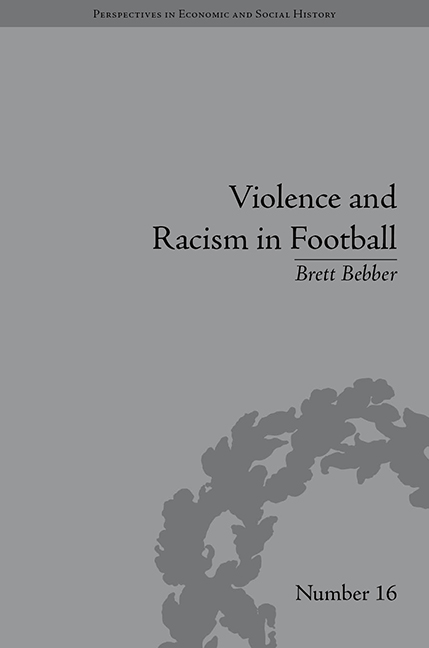Book contents
- Frontmatter
- CONTENTS
- Acknowledgements
- List of Figures
- Introduction: Sport, Politics and History in Post-War Britain
- Part I Violence and Politics in British Football
- 1 An Introduction to Football Violence: Context, Community and Conflict
- 2 Moral Anxieties, National Mythologies and Football Violence
- Part II The Total Policy of Containment
- Part III Racism and Cultural Conflict in British Football
- Conclusion: Legacies of Violence in British Football
- Notes
- Bibliography
- Index
2 - Moral Anxieties, National Mythologies and Football Violence
from Part I - Violence and Politics in British Football
- Frontmatter
- CONTENTS
- Acknowledgements
- List of Figures
- Introduction: Sport, Politics and History in Post-War Britain
- Part I Violence and Politics in British Football
- 1 An Introduction to Football Violence: Context, Community and Conflict
- 2 Moral Anxieties, National Mythologies and Football Violence
- Part II The Total Policy of Containment
- Part III Racism and Cultural Conflict in British Football
- Conclusion: Legacies of Violence in British Football
- Notes
- Bibliography
- Index
Summary
Several groups surrounding the football industry – including clubs, police officials, the press and the state – created a moral outcry about the increasing outbreaks of violence among working-class youths. Though some scholars have noted the development of a moral panic in football, especially as articulated within the popular press, this chapter aims to analyse the construction of this moral panic and contextualize it within the political and social context of the late 1960s and 1970s. While press discourse certainly contributed to the sensationalization of football violence, this cultural crisis cannot be understood without attention to the leading role of political rhetoric from moral entrepreneurs and police agents who powerfully engaged the public and used football disorder to displace anxiety from the material to the cultural realm. Certainly, supporters instigated, organized and carried out violent activities, forcing political authorities to act. Public and political fears of football violence were not unfounded. Yet, given their inability to prevent the phenomenon or effect improvement in British society and the football industry in material terms, politicians instead used the occasion to address propriety and perceived national decline. The moral reactions against football disorder provided opportunities for British politicians from both parties to redefine and maintain ideas of nationhood, acceptable working-class conduct and suitable masculine behaviour. Their political arguments displaced responsibility for poverty and unemployment through the revival of Victorian discourses.
- Type
- Chapter
- Information
- Violence and Racism in FootballPolitics and Cultural Conflict in British Society, 1968–1998, pp. 39 - 68Publisher: Pickering & ChattoFirst published in: 2014



